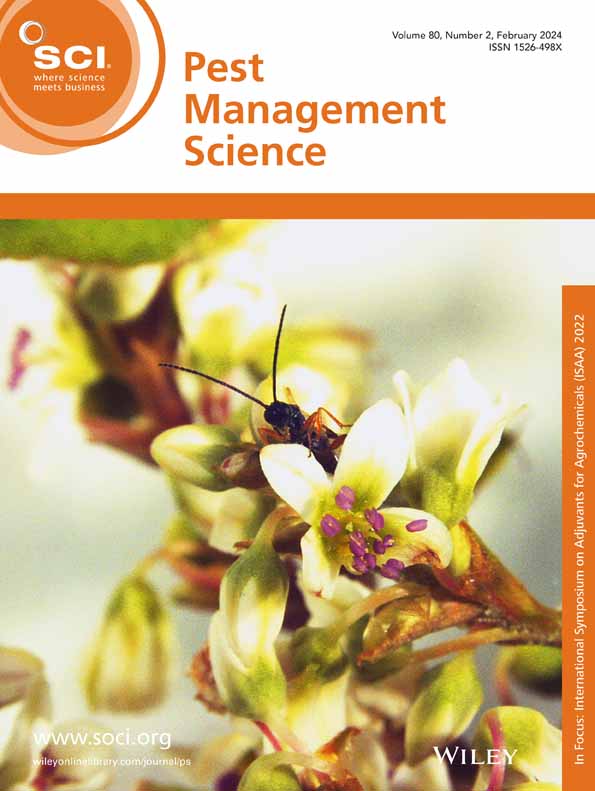velezensis LQ-03对辣椒炭疽病病原菌炭疽病的生物防治能力及可能机制
IF 3.8
1区 农林科学
Q1 AGRONOMY
引用次数: 0
摘要
辣椒炭疽病是由炭疽菌引起的一种具有破坏性的病害。目前,炭疽病主要通过杀菌剂进行控制,但传统化学杀菌剂的长期过度使用会对环境和人体健康产生不利影响。因此,有必要探索更安全的方法来控制辣椒炭疽病,以减轻环境和食品安全风险。利用芽孢杆菌进行生物防治是一种很有前景的策略。结果鉴定到的velezensis芽孢杆菌菌株LQ-03对scovillei等多种植物病原菌具有明显的拮抗活性。LQ-03能有效防治辣椒炭疽病,提高辣椒果实防御酶活性。LQ-03粗蛋白提取物显著抑制了scovillei菌丝生长、孢子萌发和活力,破坏了形态结构和细胞膜完整性,诱导活性氧(ROS)积累。粗蛋白提取物有效地抑制了辣椒果实炭疽病的发展。转录组分析显示,提取物通过重编程多种代谢途径发挥抗真菌活性,特别是那些涉及能量转换的途径。从LQ-03基因组中预测了几个可能负责生物活性化合物合成的生物合成基因簇(BGCs)。结论LQ-03是一种很有前途的辣椒炭疽病防制剂,为开发为天然杀菌剂提供了理论依据。©2025化学工业协会。本文章由计算机程序翻译,如有差异,请以英文原文为准。
Biocontrol ability and possible mechanism of Bacillus velezensis LQ-03 against Colletotrichum scovillei, the pathogen of anthracnose on chili pepper.
BACKGROUND
Pepper anthracnose caused by Colletotrichum scovillei is a destructive disease. Currently, anthracnose diseases are primary controlled using fungicides, but prolonged overuse of conventional chemical fungicides can adversely affect both the environment and human health. Thus, it is essential to explore safer alternative methods for controlling pepper anthracnose to mitigate environmental and food safety risks. One promising strategy is biocontrol utilizing Bacillus species.
RESULTS
We identified the Bacillus velezensis strain LQ-03, which demonstrated significant antagonistic activity against C. scovillei and various other plant pathogens. LQ-03 exhibited effective control of pepper anthracnose and enhanced the activities of defense enzymes in pepper fruit. The crude protein extracts of LQ-03 significantly inhibited mycelial growth, conidial germination and viability, disrupted the morphological structure and cell membrane integrity, and induced reactive oxygen species (ROS) accumulation in C. scovillei. The crude protein extracts effectively reduced the progression of anthracnose on pepper fruit. Transcriptome analysis revealed that the extracts exert antifungal activity by reprogramming multiple metabolic pathways, particularly those involved in energy conversion. Several biosynthetic gene clusters (BGCs) potentially responsible for the synthesis of bioactive compounds were predicted from the LQ-03 genome.
CONCLUSION
Our results showed that LQ-03 is a promising biocontrol agent against anthracnose caused by C. scovillei in pepper, providing a theoretical basis for development as a natural fungicide. © 2025 Society of Chemical Industry.
求助全文
通过发布文献求助,成功后即可免费获取论文全文。
去求助
来源期刊

Pest Management Science
农林科学-昆虫学
CiteScore
7.90
自引率
9.80%
发文量
553
审稿时长
4.8 months
期刊介绍:
Pest Management Science is the international journal of research and development in crop protection and pest control. Since its launch in 1970, the journal has become the premier forum for papers on the discovery, application, and impact on the environment of products and strategies designed for pest management.
Published for SCI by John Wiley & Sons Ltd.
 求助内容:
求助内容: 应助结果提醒方式:
应助结果提醒方式:


